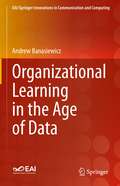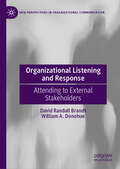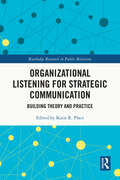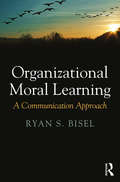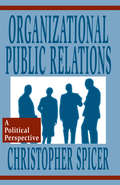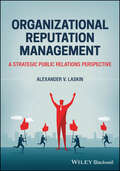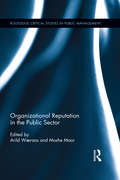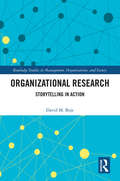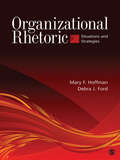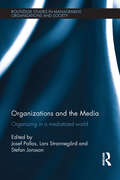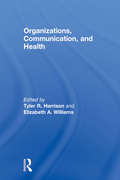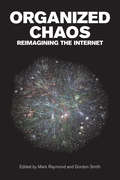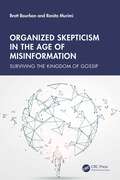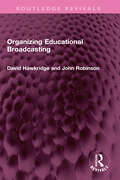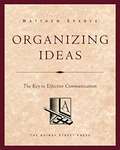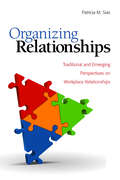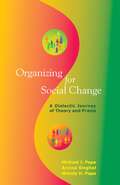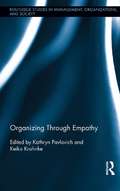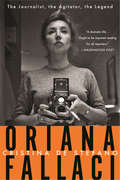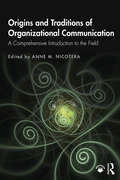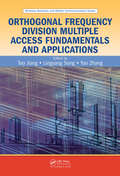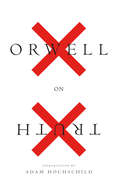- Table View
- List View
Organizational Learning in the Age of Data (EAI/Springer Innovations in Communication and Computing)
by Andrew BanasiewiczThis book discusses the impact of advanced information technologies, such as data processing, machine learning, and artificial intelligence, on organizational decision-making processes and practices. One of the book’s central themes is the interplay between human reasoning and machine logic in the context of organizational functioning, specifically, the fairly common situations in which subjective beliefs are pitted against objective evidence giving rise to conflict rather than enhancing the quality of organizational sensemaking. Aiming to not only raise the awareness of the potential challenges but also to offer solutions, the book delineates and discusses the core impediments to effective human-information technology interactions, and outlines strategies for overcoming those obstacles on the way to enhancing the efficacy of organizational decision-making.
Organizational Listening and Response: Attending to External Stakeholders (New Perspectives in Organizational Communication)
by William A. Donohue David Randall BrandtThis book argues that listening to constituents who reside outside organizational boundaries, but who are essential members of an organization’s ecosystem, is a vital constitutive element of organizational communication. It also attempts to demonstrate that, by and large, the field of organizational communication has neglected such listening. The book goes on to introduce a conceptual and methodological framework organizations can use to assess listening practices and effectiveness. Through a combination of theory, research, and case illustrations, the book will be valuable to both scholars and practitioners in the fields of organizational communication, marketing, and public relations. It will provide insight and direction for theory-building, knowledge development, and implementation of best practices.
Organizational Listening for Strategic Communication: Building Theory and Practice (Routledge Research in Public Relations)
by Katie R. PlaceEmbracing listening as a useful tool for strengthening organization-publics and organization-employee relationships, this book offers theoretical and practical insights for listening across myriad strategic communication contexts. Chapters authored by a diverse global collective of communication scholars and professionals present original research and case examples of listening for strategic communication in corporate, government, and nonprofit environments. They explore topics such as utilizing artificial intelligence and social media; activism, social justice, and ethics; and fostering diversity, equity, and inclusion within and outside organizations. Each chapter concludes with recommendations for strategic communication practice. This book will be of interest to researchers and advanced students in public relations and strategic communication, organizational communication, and listening.
Organizational Moral Learning: A Communication Approach
by Ryan S. BiselWinner of two National Communication Association awards: Communication Ethics Division's 2018 Single-Author Book of the Year Award Organizational Communication Division's 2018 Outstanding Book of the Year Award Extensive work in psychology and neuroscience reveals that individuals are born with moral intuitions, and this volume capitalizes on that recent insight to provide a new perspective on how to lead organizational ethics. Organizational Moral Learning presents communication-based recommendations for managers and leaders to encourage authentic moral dialogue at work so that these discussions can be used to update work practices vigilantly as organizations strive for ethical excellence. Organizational ethics are crucial to individual, organizational, national, and even global well-being, and this work leads a revolution in thinking about how to manage organizational ethics. Written accessibly for students and practitioners alike, this book provides a leading-edge look at organizational ethics based on science and research applicable to a worldwide audience.
Organizational Public Relations: A Political Perspective (Routledge Communication Series)
by Christopher SpicerPublic relations practitioners are often called upon to help chart their organization's strategic development, thus functioning as managerial decision makers linking the organization to its larger environment. This book is about understanding organizations, especially the role played by organizational decision making in the development and implementation of public relations programs and activities. It emphasizes the ways in which an organization's culture and decision making processes ultimately influence the success or failure of their public relations efforts. The research, case studies, and author's interpretations and suggestions explore the often confusing netherworld of organizational mindsets -- particularly as those world views affect the organization's relations with clients and other stakeholders. Understanding organizational politics is the way to understanding how and why decisions are made by the organization's dominant coalition. The primary goal of this text is to enhance our understanding of the ways in which organizations "work" -- the political process that accompanies organizational decision making. As an instrumental participant in the organizational political process, the public relations practitioner must posess knowledge and understanding of the organization's political process in order to succeed within that organization. Given the need for public relations practitioners to form coalitions, negotiate consensus, and advocate organizational interests, the political system metaphor is most approriate for understanding the relationship between organizational power and organizational public relations. This book, then, "steps back" from a focus solely on the design of public relations programs, and instead examines how the impetus for those programs emerges within the organization as a result of organizational politics in action. Its special features include: * practitioner responses at the end of each chapter providing commentary on the usefulness of the ideas presented; * sidebars from popular sources illustrating theories; * new case studies; * merging of management and organizational theory and research with communication theory and research; * a focus on external stakeholders from both an advocacy and a collaborative frame resulting in the creation of a "collaborative advocacy" framework for external communication; and * an extended examination of ethical considerations pertaining to organizational decision making and communication.
Organizational Reputation Management: A Strategic Public Relations Perspective
by Alexander V. LaskinORGANIZATIONAL REPUTATION MANAGEMENT Teaches public relations through the management of relationships with key organizational publics, perfect for business and management students Organizational Reputation Management: A Strategic Public Relations Perspective presents comprehensive coverage of how corporations, governments, and non profit organizations build and maintain their reputation. This unique textbook provides students with a solid understanding of the function of public relations as a strategic activity, as author Alexander V. Laskin offers a real-world relationship management perspective while employing an innovative approach to defining and analyzing reputation. Student-friendly chapters introduce all essential concepts of reputation management, describe the entire process of reputation management, help future organizational leaders appreciate the importance of reputation, explain measurement and evaluation methods, and define organizational reputation through relationships with key stakeholders such as investors, employees, and customers. Designed to be used with the PRSA MBA/Business School Initiative curriculum, Organizational Reputation Management demonstrates how to apply the Research, Planning, Implementation, and Evaluation (RPIE) process, the Paid, Earned, Shared, and Owned (PESO) communications model, the Barcelona Principles, and other key public relations concepts in the context of organizational reputation. Organizational Reputation Management: A Strategic Public Relations Perspective is the ideal textbook for undergraduate and graduate courses in reputation management, public relations management, and strategic communication.
Organizational Reputation in the Public Sector: Branding, Identity, And Images Of Government (Routledge Critical Studies in Public Management)
by Moshe Maor Arild WæraasA favorable reputation is an asset of importance that no public sector entity can afford to neglect because it gives power, autonomy, and access to critical resources. However, reputations must be built, maintained, and protected. As a result, public sector organizations in most OECD countries have increased their capacity for managing reputation. This edited volume seeks to describe, explain, and critically analyze the significance of organizational reputation and reputation management activities in the public sector. This book provides a comprehensive first look at how reputation management and branding efforts in public organizations play out, focusing on public agencies as formal organizations with their own hierarchies, identities, and cultures – existing in a network of other public organizations with similar or different functions, power, and reputation. From this unique organizational perspective, the chapters in this volume examine issues such as organizational identity, power, conflict, politics, culture, and symbolism within the public sector. Paying specific attention to strategies and processes, and illustrating with examples from the countries of Belgium, Denmark, Norway, Ireland, Israel, Italy, and Sweden, the book deepens our understanding of reputation management efforts at various levels of government.
Organizational Research: Storytelling in Action (Routledge Studies in Management, Organizations and Society)
by David M. Boje‘Organizational research methods’ (ORM) are making an ontological turn by studying the nature of Being, becoming, and the meaning of existence in the world. For example, without ontology, there is no ‘ground’ and no ‘theory’ in Grounded Theory (GT). This book explores ten ways to develop fourth wave GT that is grounded and theory. 1st wave GT commits inductive fallacy inference, 2nd wave GT bandaids it with positivistic content coding. 3rd wave GT turns to social constructivism, but this leaves out the materiality and ecology of existence. The first three waves do not address falsification or verification. There is another theme. Qualitative research methods is a discipline craft, not mere science or something that automated text analysis software can displace. Quantiative narrative analysis (QDA) is one more way to colonize and marginalize indigenous ways of knowing (IWOK). Without an ontological turn, its the death of storytelling predicted by Walter Benjamin and Gertrude Stein predicted. The good news is Western Empirical Science is beginning to listen to IWOK-Native Science experiential living story method of relations not only to other humans but to other animals, plants, to living air, water, and earth in living ecosystem of an enchanted world There is a gap in the qualitative research methodology practices and comprehensive advanced approaches causing a split between practice and theory. So called Grounded Theory (inductive positivism) . Organizational Research: Storytelling in Action is about how to conduct ten kinds of ontological Research Methods and conduct their interpretative analyses, for organization studies, in an ethically answerable way. It is aimed at people who want a more ‘advanced’ treatment than available in so-called Grounded Theory or automated narrative analysis books.
Organizational Rhetoric: Situations and Strategies
by Mary F. Hoffman Debra J. FordAn unprecedented text explains how to analyze the role of rhetoric in organizationsIntegrating rhetorical theories and methods with principles of organizational communication, this pioneering text provides students with a step-by-step method for analyzing and critiquing examples of organizational rhetoric. The first half of the book offers an accessible introduction to rhetorical research, theory, and criticism and equips students for analyzing the messages of organizations in a variety of contexts. The second half focuses on needs in real-life organizational situations: to create and maintain identity; to manage messages about issues, risk, and crisis; and to communicate with those "inside" the organization.Contemporary examples and case studies (including a dispute over clean energy in Texas, efforts on the part of restaurant owners in New York to fight food labeling requirements, and a university′s announcement that it is building a "body farm") illustrate the importance of this area of study and provide opportunities for students to apply their emerging analytical and critical thinking skills.Key FeaturesGrounds the explanation and critique of persuasive organizational messages in traditional and contemporary rhetorical literatureShows students how to critique the messages organizations use to create and maintain organizational powerDemonstrates the importance of rhetoric to the success of the organizationUses case studies and accompanying worksheets to help students move through the process of analyzing sample situations and messagesCovers image/impression management, issue management, crisis management, and other key facets of organizational rhetoricIncludes models of the book′s method for analysis at the beginning of each chapter to help students visualize how each step fits into the larger systemIntended AudienceOrganizational Rhetoric: Situations and Strategies is ideal for a wide range of courses at the upper-level undergraduate and master′s level, including Organizational Communication, Organizational Studies, Public Relations, and Rhetorical Studies. This first-of-its-kind textbook is also an essential addition to the libraries of Communication/Rhetoric and Business instructors.
Organizations and the Media: Organizing in a Mediatized World (Routledge Studies in Management, Organizations and Society)
by Stefan Jonsson Josef Pallas Lars StrannegårdThe relationship between media and the organizations they cover has changed dramatically in the last few decades, which have witnessed a huge expansion of news coverage focusing on different types of organizations and their activities. In parallel, organizations have dramatically increased their investment in public relations and other media-oriented forms of communication. Like other societal developments – globalization, marketization, individualization, scientification – mediatization has become an institutional force. This book analyses the mediatization of contemporary organizations and how individual organizations, industry or markets are scrutinized. It examines its key influence on the actions of organizations, and how it shaptes the entire landscape in which the organizations operate. What such a perspective provides is the accentuation of the interplay between organizations and different parts of the society as embedded in the media and its logic. This will be essential reading for professionals, academics and advanced students in organizational studies, public relations and media studies.
Organizations, Communication, and Health
by Tyler R. Harrison Elizabeth A. WilliamsOrganizations, Communication, and Health focuses on theories and constructs of organizational communication and their relationship to health. The goal of the volume is to offer a current picture of organizational and organizing processes and practices related to health. Research in the area of health communication has expanded in recent years, and this research has advanced understandings of campaigns, patient/provider interactions, and social support. However, a gap in the area of health, organizations, and organizing processes emerged, a niche this volume fills. It does so by having chapters identify an organizational theory or organizing process and how aspects of that theory relate to health. Chapters discuss how to marry theory to practice and the other factors (e.g., organizational structure, role, occupation, industry, or environment) that need to be considered in the process of utilizing the theory in organizations. This volume, aimed at advanced undergraduate and graduate students studying health communication, as well as health professionals, provides useful theory and practice related the organizations and health, and issues a call for further theorizing on the practice of health communication in organizations.
Organized Chaos: Reimagining the Internet
by Gordon Smith Mark RaymondThe Internet is constantly evolving, and has economic, political and social importance as a public good. A coherent strategy for Internet governance is needed to ensure that difficult tradeoffs between competing interests, as well as between distinct public values, are managed in a consistent, transparent and accountable manner that accurately reflects public priorities. In Organized Chaos: Reimagining the Internet, edited by Mark Raymond and Gordon Smith, leading experts address a range of pressing challenges, including cyber security issues and civil society hacktivism by groups such as Anonymous, and consider the international political implications of some of the most likely Internet governance scenarios in the 2015-2020 time frame. Together, the chapters in this volume provide a clear sense of the critical problems facing efforts to update and redefine Internet governance, the appropriate modalities for doing so, and the costs and benefits associated with the most plausible outcomes. This foundation provides the basis for the development of the research-based, high-level strategic vision required to successfully navigate a complex, shifting and uncertain governance environment.
Organized Chaos: Reimagining the Internet
by Mark Raymond and Gordon SmithThe Internet is constantly evolving, and has economic, political and social importance as a public good. A coherent strategy for Internet governance is needed to ensure that difficult tradeoffs between competing interests, as well as between distinct public values, are managed in a consistent, transparent and accountable manner that accurately reflects public priorities. In Organized Chaos: Reimagining the Internet, edited by Mark Raymond and Gordon Smith, leading experts address a range of pressing challenges, including cyber security issues and civil society hacktivism by groups such as Anonymous, and consider the international political implications of some of the most likely Internet governance scenarios in the 2015–2020 time frame. Together, the chapters in this volume provide a clear sense of the critical problems facing efforts to update and redefine Internet governance, the appropriate modalities for doing so, and the costs and benefits associated with the most plausible outcomes. This foundation provides the basis for the development of the research-based, high-level strategic vision required to successfully navigate a complex, shifting and uncertain governance environment.
Organized Skepticism in the Age of Misinformation: Surviving the Kingdom of Gossip
by Brett Bourbon Renita MurimiDrawing from philosophy, information theory, and network science, Organized Skepticism in the Age of Misinformation: Surviving the Kingdom of Gossip offers a novel conceptual framework that views information as a form of gossip.This book challenges the idea that truthfulness is a necessary, or even a relevant condition, of information. Instead, this book develops a conceptual framework in which information is understood as gossip, which fits within a more general account of information and knowledge as constrained but contingent social practices. Using this framework, this book provides a nuanced understanding of the “grammar” of gossip that permeates both online and real‑orld environments and sheds light on the often overused and confused terms of our time: information, misinformation and knowledge.This book offers a fundamental reconfiguration of the evolving virtual interdependence of humans and information technology. It is a key resource for students and scholars in areas relating to social media, information diffusion, human/computer interface, and computational social science.
Organizing Educational Broadcasting (Routledge Revivals)
by John Robinson David HawkridgeFirst published in 1982, Organizing Educational Broadcasting provides advice and guidance in organizational and managerial skills for those responsible for the operation of educational broadcasting systems. It is principally designed for those who actually work within educational radio and television systems. They are the people who perhaps stand to gain most by reading about international case studies. In addition, high-level decision-makers, planners and others who are concerned with conceptualizing, planning and implementing new systems, or more likely, modifying old ones, will find much to interest them.
Organizing Ideas: The Key to Effective Communication (Organizing Ideas Series)
by Matthew SpenceWhereas most books on business writing focus on correcting errors in grammar and usage, Organizing Ideas shows how to apply the principles of effective communication to organize and express your ideas. The approach explained in Organizing Ideas has been used for over 60 years to teach communication skills to professionals at leading American companies. <p><p> The book shows how to identify your key message in any communication and develop a persuasive argument to support it. You will learn to tailor any message to the needs of your audience. Special chapters show how to compose effective e-mail, prepare presentations that are conceptually clear and visually appealing, and write documentation that people actually read. Organizing Ideas also presents nine simple principles for editing—all you need to ensure that your paragraphs and sentences are easy to read and understand. <p><p> A companion volume, Business Writing: The Good, the Bad, and the Ugly, illustrates with before-and-after examples how to apply the principles in Organizing Ideas to improve the clarity of all types of business documents.
Organizing Relationships: Traditional and Emerging Perspectives on Workplace Relationships
by Patricia M. Sias"Organizing Relationships makes a contribution to the discipline in its treatment of this area from multiple perspectives, in its deliberate engagement/suggestions of future research directions, and its functional purpose of bringing together extant research on this important topic in a coherent and organized way. It adds cumulatively to our knowledge of organizational communication and relationships, it fits within the horizon of the established parameters of our field while opening new areas for engagement, and, moreover, it is a very interesting read. It will, no doubt, become a touchstone for the field of organizational communication." —Janie Hardin Fritz, Duquesne University "This book represents an important step to a relational approach to organizational behavior (communication) by pulling together many different areas/types of relationships. It will be a ′must′ book to anyone who teaches relationships in organization or broadly relational/applied organizational communication." —Jaesub Lee, University of Houston The first book in the field to provide a comprehensive, interdisciplinary treatment of workplace relationships, Organizing Relationships: Traditional and Emerging Perspectives on Workplace Relationships explores both negative and positive workplace relationships, including supervisor–subordinate relationships, peer relationships, workplace friendships, romantic workplace relationships, and customer–client relationships. Author Patricia M. Silas, a recognized scholar in the field, examines workplace relationships from multiple theoretical perspectives, including postpositivism, social construction theory, critical theory, and structuration theory. She helps readers understand the unique influences of the workplace on relationship processes and dynamics. Key Features Examines the role of workplace relationships as information-sharing, resource-distributing, decision-making, and support systems and highlights their importance to both organizational and individual well-being Includes cases in each chapter that demonstrate the usefulness of approaching real-world workplace problems and issues from multiple perspectives Helps readers broaden and enrich the ways they think about workplace relationships and their roles in organizational processes Provides an innovative agenda for future research Organizing Relationships is appropriate for upper-level undergraduate and graduate courses in Workplace Relationships, Relational Communication, Applied Interpersonal Communication, Organizational Communication, Communication Management, Operations/Human Resource Management, Organizational Psychology, and Organizational Sociology.
Organizing for Social Change: A Dialectic Journey of Theory and Praxis
by Michael J. Papa Arvind M. Singhal Wendy H. Papa`The body of work this book represents is clearly important both theoretically and in terms of encouraging scholars and practitioners in continuing efforts of large-scale change and social justice. The cases considered are fascinating, and the authors′ analyses of them are enlightening′ - Katherine Miller Professor, Department of Communication, Texas A&M University `In Organizing for Social Change, one rediscovers the value of dialectics within a theoretically complex story of empowerment and transformation that is told in a very personal tone with careful attention to detail′ - Patrice M Buzzanell, Professor, Department of Communication, Purdue University `Scholars and practitioners will find this book theoretically sound, methodologically rigorous, and rich with poignant narratives. The book models engaged scholarship; it is truly refreshing to encounter scholarship that matters to various stakeholders, academic and otherwise′ - Lynn M. Harter Assistant Professor, School of Communication Studies, Ohio University Conventionally, analysts of social change perceive organizational initiatives in binary terms: for instance, projects are seen as being either top-down or bottom-up; local culture is seen as being either modern or traditional. Challenging this restrictive dualistic sentiment, this important book argues that social change emerges in a nonlinear, circuitous and dialectic process of struggle between competing poles of action. In support of their approach, the authors: - identify four dialectic tensions as being central to the process of organizing for social change: control and emancipation, oppression and empowerment, dissemination and dialogue, and fragmentation and unity; - argue for a dialectic approach which acknowledges that contradictory tensions can and do co-exist (for example, a project can control beneficiaries with tough conditionalities even as it emancipates them through economic empowerment); and - draw upon cases set in various contexts-social justice, academic, corporate, artistic, and others-from both developing and developed countries. The authors elaborate their thesis by examining four cases in depth: the Grameen Bank in Bangladesh; the dairy cooperatives of India′s National Dairy Development Board; entertainment-education broadcasts and on-the-ground community organizing in Indian villages; and community suppers in Appalachia (USA). Combining quality scholarship with a very interesting writing style, drawning from everyday life and its new insights into the processes of social change, this absorbing book is an essential text for scholars and practitioners of communication, social work, gender studies and social change.
Organizing through Empathy (Routledge Studies in Management, Organizations and Society)
by Kathryn Pavlovich Keiko KrahnkeEmpathy dissolves the boundaries between self and others, and feelings of altruism towards others are activated. This process results in more compassionate and caring contexts, as well as helping others in times of suffering. This book provides evidence from neuroscience and quantum physics that it is empathy that connects humanity, and that this awareness can create a more just society. It extends interest in values-based management, exploring the intellectual, physical, ecological, spiritual and aesthetic well-being of organizations and society rather than the more common management principles of maximising profit and efficiency. This book challenges the existing paradigm of capitalism by providing scientific evidence and empirical data that empathy is the most important organizing mechanism. The book is unique in that it provides a comprehensive review of the transformational qualities of empathy in personal, organizational and local contexts. Integrating an understanding based upon scientific studies of why the fields of positive psychology and organizational scholarship are important, it examines the evidence from neuroscience and presents leading-edge studies from quantum physics with implications for the organizational field. Together the chapters in this book attempt to demonstrate how empathy helps in the reduction of human suffering and the creation of a more just society.
Oriana Fallaci: The Journalist, the Agitator, the Legend
by Marina Harss Cristina De StefanoA landmark biography of the most famous Italian journalist of the twentieth century, an inspiring and often controversial woman who defied the codes of reportage and established the "La Fallaci" style of interview.Oriana Fallaci is known for her uncompromising vision. To retrace Fallaci's life means to retrace the course of history from World War II to 9/11.As a child, Fallaci enlisted herself in the Italian Resistance alongside her father. Her hatred of fascism and authoritarian regimes would accompany her throughout her life. Covering the entertainment industry early on in her career, she created an original, abrasive interview style, focusing on her subject's emotions, contradictions, and facial expressions more than their words. When she grew bored of interviewing movie stars and directors, she turned her attention to the greatest international figures of the time: Khomeini, Gaddafi, Indira Gandhi, and Kissinger, placing herself front and center in the story. Reporting from the front lines of the world's greatest conflicts, she provoked her own controversies wherever she was stationed, leaving behind epic collateral damage in her wake.Thanks to unprecedented access to personal records, Cristina De Stefano brings back to life a remarkable woman whose groundbreaking work and torrid love affairs will not soon be forgotten. Oriana Fallaci allows a new generation to discover her story, and witness the passionate, persistent journalism that we urgently need in these times of upheaval and uncertainty.
Origami Antennas for Wireless Communication Systems
by Slawomir Koziel Shahid Bashir Syed Imran ShahThis book discusses the lightweight, reconfigurable, and deployable origami antennas for adaptive communication systems. Traditional antennas, with their fixed characteristics, struggle to meet the evolving needs of modern communication systems. Reconfigurable antennas, on the other hand, can dynamically adjust their operating parameters, offering significant advantages in terms of performance, size, and cost. Origami technology has emerged as a disruptive force in antenna design, enabling the development of lightweight, reconfigurable antennas with tailored radiation characteristics. Deployable origami antennas offer a transformative solution for applications demanding mobility and rapid deployment in challenging environments. These innovative antennas hold immense promise to revolutionize communication systems, paving the way for a future where adaptability and versatility are paramount. This book offers a comprehensive guide to origami antenna technology, encompassing both fundamentals and practical applications. It might be a valuable resource for researchers and engineers working in the field of antenna development, particularly those focused on wireless communication systems with reconfigurability and deployability are essential design prerequisites.
Origins and Traditions of Organizational Communication: A Comprehensive Introduction to the Field
by Anne M. NicoteraOrigins and Traditions of Organizational Communication provides a sophisticated overview of the fundamentals of organizational communication as a field of study, examining the field’s foundations and providing an assessment of the field to date, explaining and demonstrating a communicational approach to the study of organization. It provides a set of literature reviews on focused topics written by experts in each area, and links organizational communication theory and research to practice. In reviewing foundational management theory, the book analyzes how early to mid-20th-century management theories shaped contemporary organizations, providing students both with background knowledge of these foundational theories and an understanding of their influence on our thinking and our organizational world. Written at an accessible level for early graduate students, yet still sophisticated enough for doctoral students, the book is ideal for students and teachers of organizational communication and communication history. Downloadable ancillary materials include chapter PowerPoints and a set of instructors' materials containing chapter abstracts, glossaries, discussion questions, annotated supplementary readings lists, and practitioners' corners.
Origins: A Short Etymological Dictionary of Modern English (Routledge Revivals: The Selected Works Of Eric Partridge Ser.)
by Eric PartridgeThis etymological dictionary gives the origins of some 20,000 items from the modern English vocabulary, discussing them in groups that make clear the connections between words derived by a variety of routes from originally common stock. As well as giving the answers to questions about the derivation of individual words, it is a fascinating book to browse through, and includes extensive lists of prefixes, suffixes, and elements used in the creation of new vocabulary.
Orthogonal Frequency Division Multiple Access Fundamentals and Applications
by Lingyang Song Tao Jiang Yan ZhangSupported by the expert-level advice of pioneering researchers, Orthogonal Frequency Division Multiple Access Fundamentals and Applications provides a comprehensive and accessible introduction to the foundations and applications of one of the most promising access technologies for current and future wireless networks. It includes authoritative cove
Orwell on Truth
by George Orwell Adam HochschildOver the course of his career, George Orwell wrote about many things, but no matter what he wrote the goal was to get at the fundamental truths of the world. He had no place for dissemblers, liars, conmen, or frauds, and he made his feelings well-known. In Orwell on Truth, excerpts from across Orwell’s career show how his writing and worldview developed over the decades, profoundly shaped by his experiences in the Spanish Civil War, and further by World War II and the rise of totalitarian states. In a world that seems increasingly like one of Orwell’s dystopias, a willingness to speak truth to power is more important than ever. With Orwell on Truth, readers get a collection of both powerful quotes and the context for them.
